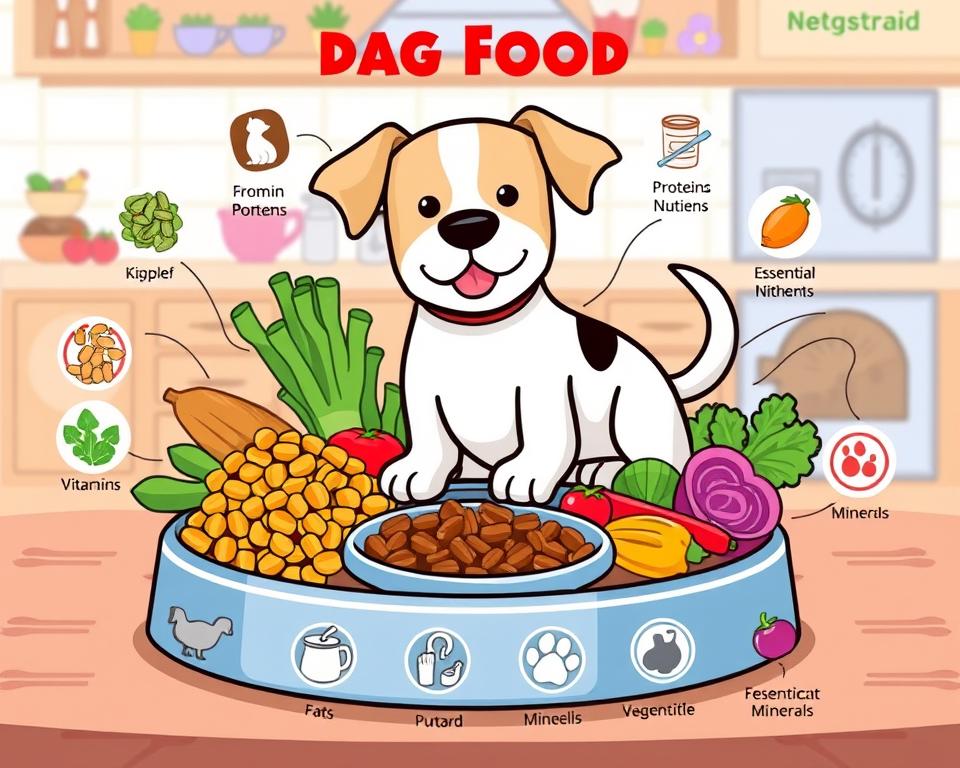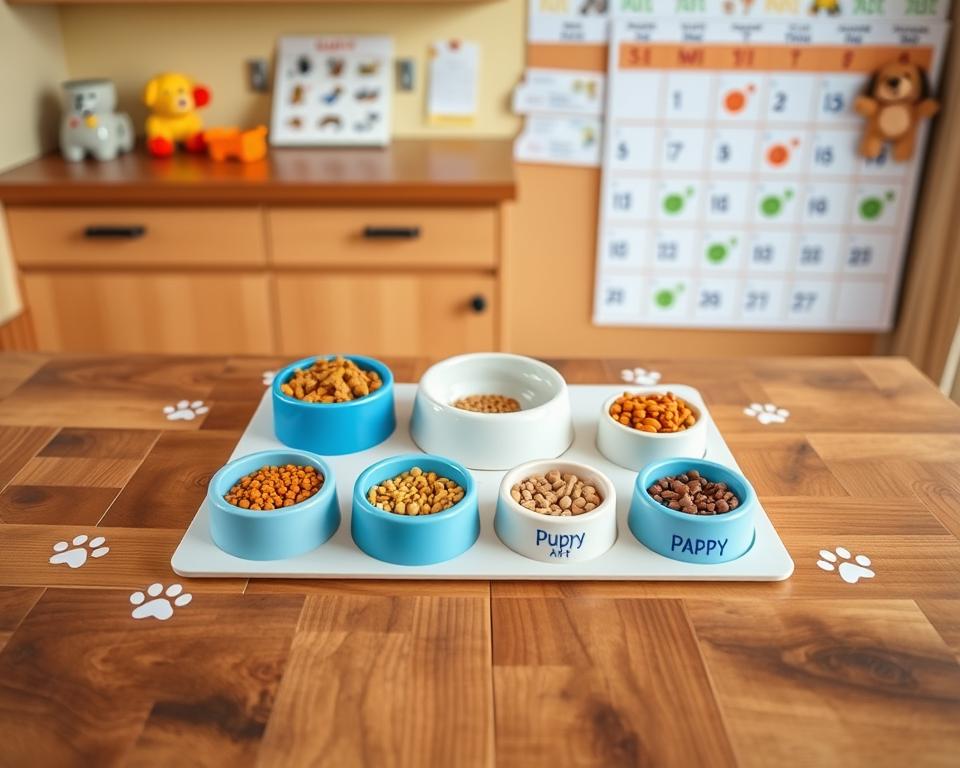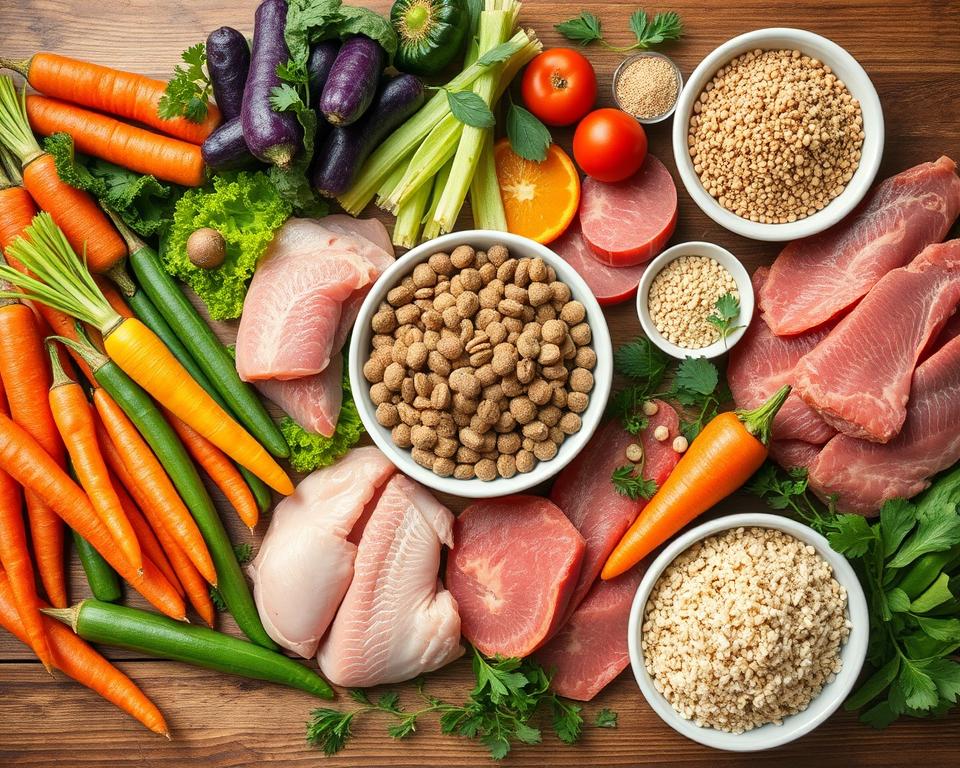Feeding your dog the right food is key to their health and happiness. Different dogs need different things based on their age, breed, and how active they are. It’s important to know what nutrients dogs need, like water, proteins, fats, carbs, vitamins, and minerals.
By giving your dog a top-notch, balanced diet, you help them stay healthy and happy. This ensures they live a long, joyful life.
Key Takeaways
- A dog’s diet should be tailored to their specific needs based on age, breed, and activity level.
- Ensuring your dog gets the right balance of essential nutrients is crucial for their overall health.
- High-quality, complete, and balanced dog food can help your pup live a long and healthy life.
- Understand the benefits of different dog food ingredients, such as proteins, fats, and carbohydrates.
- Consult with your veterinarian to determine the best dog nutrition tips for your pup.
Understanding Your Pup’s Nutritional Needs
As pet owners, knowing what your dog needs is key. Dogs are omnivores, which means they can eat both plants and animals. This makes it easy to give them a balanced diet with proteins, fats, carbs, vitamins, and minerals.
Nutrients Your Dog Needs
Dogs need six main nutrients to stay healthy:
- Water – This makes up 60-70% of a dog’s body weight and is essential for life.
- Proteins – The building blocks for cells, tissues, and organs.
- Fats – Provide concentrated energy and support cell structure.
- Carbohydrates – Supply energy and support gut health.
- Vitamins – Enable normal metabolic functioning.
- Minerals – Also crucial for physiological processes.
Dogs as Omnivores
Even though dogs are often seen as carnivores, they can eat plants too. They can get all the nutrients they need from a balanced diet that includes plants. But, eating only meat is not enough for their health.

Feeding Your Puppy: A Comprehensive Guide
Raising a healthy, happy puppy means understanding their nutritional needs. Puppies grow fast, so they need a diet that matches their age and size. This guide will help you ensure your puppy grows well.
Weaning and Feeding Your Puppy
Weaning is a key time for puppies, as they start eating solid food. They should start eating solid food between 3-4 weeks old. By 7-8 weeks, they should be fully weaned.
As puppies grow, they need more food and nutrients. A puppy feeding schedule with the right mix of proteins, fats, and vitamins is vital. Young pups eat a lot, and they can grow a lot in the first year or two.
- 6–12 weeks: Four feedings a day are usually adequate for growing puppies; large breed puppies should be fed unmoistened dry puppy food by 9 or 10 weeks, small dogs by 12 or 13 weeks.
- 3–6 months: Feedings can be decreased from four to three a day; puppies should be losing potbelly and pudginess by 12 weeks.
- 6–12 months: Begin feeding puppies twice daily; spaying or neutering lowers a puppy’s energy requirements slightly, switch from nutrient-rich puppy food to adult maintenance dog food around this time.
- After age 1: Most owners will choose to feed adult dogs their daily amount of food split between two meals.
Check your puppy’s weight weekly and compare it to breed charts. This helps adjust feeding amounts for puppy growth for proper growth. Changing a puppy’s diet too fast can cause stomach problems. Always talk to a vet before changing their food.

Best Dog Nutrition Tips
To make sure your dog gets the best nutrition, choose high-quality commercial dog food. It should meet the standards of the Association of American Feed Control Officials (AAFCO). Look for labels with whole, recognizable ingredients. Avoid foods with lots of fillers or by-products.
Puppies need a special puppy formula to help them grow. Adult dogs do well on a maintenance diet. Feed based on your dog’s ideal weight and activity level. Adjust as needed. Too much food can cause health problems, so don’t overfeed.
Supplements are usually not needed if your dog eats a complete and balanced diet. But, it’s wise to talk to your vet if you’re unsure about your dog’s nutrition. By following these tips, you can help your dog stay healthy and reach their full potential.
Ready to take your dog’s training to the next level? Discover our expert-designed product by clicking here and start seeing real results!

